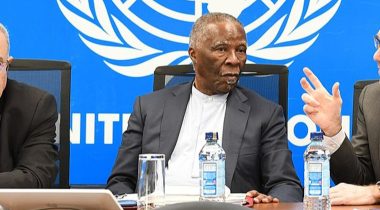
Nick Shaxson ■ Global tax body: “After 3 days of bullying, developing countries were run over”

The Third International Conference on Financing for Development just held in Addis Ababa has held negotiations for an internationally agreed position to support the post-2015 development agenda. One of the key areas of dispute this year was international tax. More specifically, TJN and others have pushing for years for international tax rule-making to be removed from the clutches of the world’s rich countries, and developing countries being given more of a say. More precisely, we were pushing for a global tax body to help give developing countries more say.
Certain countries didn’t like that. See our recent post Ten Reasons why an Intergovernmental UN Tax Body would Benefit Everyone, for more details.
And as we noted yesterday, pre-outcome:
“African nations are at the epicenter of the crisis of illicit financial flows, yet they are not even in the room when decisions are being made,” said Alvin Mosioma, Executive Director of the Tax Justice Network Africa. “A global tax body is one important step in fixing this global problem.”
Also:
“The poorest of people bear the brunt of this problem, yet the solutions are only made by the Paris-based OECD,” said Joel Akhator Odigie of the African Regional Organization of the International Trade Union Confederation.
And the outcome? Well, Tove Maria Ryding of Eurodad gives a flavour:
“After three days of bullying, developing countries were finally run over. The consequence of the Addis Ababa outcome is that more than 100 developing countries will remain excluded from decision making on global tax standards.”
That gives a flavour of the feeling among NGOs and many others attending the conference. This matters: as Alex Cobham, TJN’s Research Director recently noted:
“The latest IMF research suggests developing countries lose revenues of more than $200 billion a year to multinationals’ profit-shifting, and OECD countries around $500 billion a year. That means developing countries lose about three times as much as a share of GDP. So it’s increasingly clear that international tax rules don’t work for OECD countries, and even less so for developing countries.”
He notes that even if the UN tax body had been given greater political weight, it would still likely be hobbled by a lack of resources. But the good news is that this issue, which has been a minority sport for a few NGOs and international tax wonks, has now risen a long way up the agenda.
This one will be back.
Related articles

The Tax Justice Network’s most read pieces of 2024

Breaking the silos of tax and climate: climate tax policy under the UN Framework Convention on International Tax Cooperation.
Seven principles of good taxation for climate finance
9 December 2024

Joint statement: It’s time for the OECD to walk the talk on human rights
The State of Tax Justice 2024

Stolen Futures: Our new report on tax justice and the Right to Education
Stolen futures: the impacts of tax injustice on the Right to Education
31 October 2024

10 Ans Après, Le Souhait Du Rapport Mbeki Pour Des Négociations Fiscales A L’ONU Est Exaucé !
CERD submission: Racialised impacts of UK’s ‘second empire’



